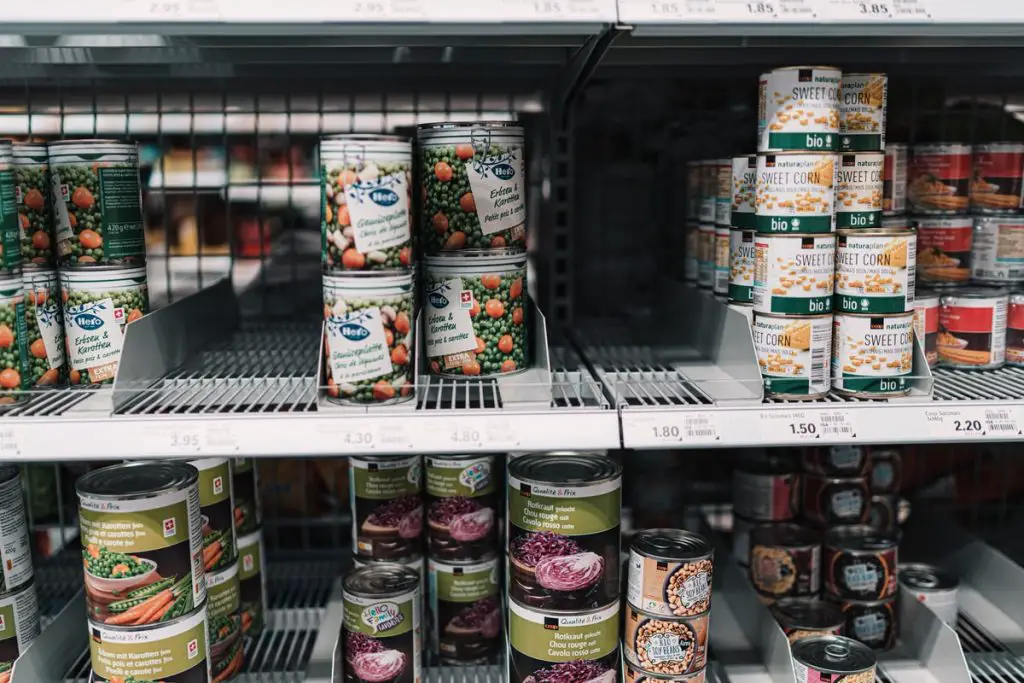You know that you should have a 30-day food supply to be ready for any crisis. But what are the best foods to stockpile? You can’t just throw some bread, vegetables, and a jar of peanut butter in the back of your pantry and call yourself well-prepared for the apocalypse. We’re here to help you build out your 30-day supply so that it has all the important foods you need. When it comes to stockpiling food for survival, variety is key: a huge stash of only powdered milk will not sustain most people for very long. Keep reading for our ideas about what’s best to include in your emergency stash.
Dried food
Dried food is a fantastic option for stockpiling, as it’s lightweight and easy to store. It lasts a long time and is easy to cook, so you don’t have to worry about it going bad during an emergency. It’s also inexpensive, which means you could buy more than one variety at once for your pantry. And because dried foods are light and compact, you can easily carry them with you if needed—which makes them great in case of evacuation or travel situations.
Baking ingredients
In addition to the basics, you should also have baking ingredients on hand. These can be used for more than just baking cakes and cookies, as they are often used in everyday cooking. The following are some of the most important items to have on hand:
- Flour
- Sugar (brown and white)
- Baking powder/soda
- Cocoa powder (unsweetened)
- Cornstarch or cornmeal (white and yellow) * Bread crumbs * Pancake mix * Oatmeal
- Cooking oil (canola or vegetable)
Canned food

Canned food is a good source of protein, fat, and carbohydrates. The best canned foods to stock up on are tuna, salmon, mackerel, sardines (with bones), chicken breast (without skin), and beef stew. Canned meats are an excellent way to add protein to your diet without cooking it yourself—just open the can!
You might be thinking: “But what if I want soup?” Well you’re in luck! Because most canned foods make great soups or stews when mixed with other ingredients or cooked in broth. You can also add them directly into casseroles for added flavor and nutrition as well as convenience.
Drinks
These beverages provide hydration, electrolytes and other nutrients that will help you maintain your health during a crisis.
- Water: You can never have enough of this essential drink. It should be stored in plastic containers with airtight lids, and rotated weekly.
- Juices: Fruit juices are an excellent source of vitamin C, which boosts the immune system. They should also be stored in airtight containers and rotated every week or so.
- Tea: Tea is another good source of vitamin C (and caffeine), but also offers several other antioxidants as well as iron and calcium—making it an excellent choice for building up your stores ahead of a crisis situation!
- Coffee: While coffee isn’t actually a survival food (it does have calories), many people find their morning cup to be vital for getting through dark days—so why not start stockpiling now? Store it in airtight glass jars or vacuum-sealed bags until needed later on down the line!
Freeze dried foods
Freeze dried foods are an excellent choice for stockpiling because they can be stored for a long time and are lightweight, so you won’t have to worry about your storage space. Although freeze drying is an expensive process, it allows food to be dehydrated at low temperatures so that the flavor and nutrients remain intact.
You can find freeze dried foods at any supermarket or on Amazon. Some popular brands include Mountain House, Backpacker’s Pantry, Emergency Essentials and Wise Foods. These companies also make kits with a variety of their products packaged together in one bag – this makes it easier to plan meals ahead of time so there’s no guesswork involved when cooking during a crisis situation!
The main advantage of freeze dried foods is that they do not require any preparation before you eat them (unlike MREs). Just open up the bag or pouch containing your selection and add hot water directly into the contents – then wait 15 minutes until everything has reconstituted itself into something resembling its former state! You don’t even need electricity when using these items either; just cook them over campfire coals! There are some disadvantages though: sometimes it may take longer than expected before all moisture has evaporated from within each item from cooking process…and sometimes certain nutrients such as vitamin C will break down over time due exposure high heat during production process.”
Herbs and spices
- Herbs and spices have a variety of uses. They can be used to flavor food, help preserve food, reduce food waste and even reduce the need for salt and oil.
- Spices like bay leaves, cinnamon sticks, cloves, dried chilies and oregano are good additions to any pantry or bunker.
- Some spices come in handy when it comes time to make riceballs: turmeric (for its anti-inflammatory properties), cumin seeds (a digestive aid) and fenugreek seeds (to improve metabolism).
Instant foods
Instant foods are a great way to supplement your food supply. With just a bit of water, you can have something satisfying and nutritious in minutes. Some examples include:
- Rice or noodles
- Pasta sauce
- Grits or oatmeal
- Potato flakes (for making mashed potatoes)
Instant foods are great for storage because they’re lightweight and don’t take up much space. You can keep them in your pantry or even under the bed! Just remember not to forget about them—they’ll go stale if left out too long. Here are some tips for using instant foods:
- Boil some water on the stovetop or use bottled water if there’s no power available; add it slowly so it doesn’t splatter everywhere when you pour it into a bowl or cup; stir until smooth; add salt and pepper as desired; enjoy! If you want to make it extra fancy, try adding cheese slices before serving
Jerky and other protein-packed foods
Protein is a big topic, because it plays a role in almost every system of the body.
The immune system needs protein to fight off pathogens and infections. The brain needs it to keep your neurons firing on all cylinders, and the endocrine system uses protein as a building block for hormones like insulin and testosterone. Your muscles need protein to repair themselves after you work out or get injured—and your heart needs it to beat properly! Even your gastrointestinal tract relies on amino acids (the units that make up proteins) for proper functioning.
So why am I telling you this? Because if there’s one thing you should stockpile during an emergency situation, it’s food with lots of protein! Think about it: If people are hungry or stressed out during crisis times, they’re not going to eat fruits or veggies; they’re going to want things that will give them energy quickly and easily. Meat fits that bill perfectly because when you cook meat at high temperatures (like grilling), all those amino acids break down into simple sugars which provide quick energy instead of requiring digestion like other sources like grains do.”
Other survival foods
You can also consider foods that are easy to prepare, high in calories and nutrition, high in protein and fiber, or high in vitamin C and iron.
For example:
- Dried beans and other legumes are easy to store (and can grow in a garden if you have one).
- Vegetables with a high fiber content such as carrots or beets will keep you feeling full for longer.
This detailed list will help you to have the right food stockpiled in your crisis preparedness plan
This list is not exhaustive. You will need to add your own items based on your family’s needs, allergies, dietary restrictions and any other special circumstances. There are a few foods I have removed from the list below because they are just too expensive to stockpile (e.g., fresh fruits and vegetables). I also want you to consider which types of foods may be more or less desirable during an extended crisis scenario and how preparedness planning might affect your family’s overall health status.
I agree that having an inventory of long-term storage foods is important, but there are many other things we need in order for our families to be safe during a crisis situation: medical supplies such as antibiotics, wound dressings and gloves; hygiene products like toilet paper; cooking utensils like pots & pans & crockpots; fuel for cooking/heating water…




